May 8, 2012
 Walking along on a dusky springtime eve
Walking along on a dusky springtime eve
I heard a noise of a bear starting to grieve—
What was this? I didn’t believe
But it was my own stomach, to which nothing did cleave.
I noticed a candle in a local watering hole,
And headed in to save my soul
(as well as my innards, which seemed an empty bowl
that was collapsing inwards as if chewed by a mole).
I ordered a feast of courses untold,
First bread and cheese filled with blue and mold
Accompanied by flagons of gin made bold
by lime juice, maraschino, violette—served cold.
Next up were plates that would make Hercules strain,
Pastas, ensalatas, empanadas, like rain
Were served alongside even more delicious mains
and a giant bucket of chilled Champagne.
I ate more food than any ten men,
The waitress came back and I started eating again
Following greens with green beans and then
Moving on to the sweets, the creams, the puddin’s.
And then the foods hit my center like a roiling brick.
I groaned, I cursed, my over-eating anything but comic
As I contemplated erupting like a fresh oil derrick.
Was there anything that could undo my stuffed predic-
ament?
And then like an angel dressed purely in serge
The waitress appeared or seemed to emerge
From my over-full haze and said through my dirge:
Sir, what you need, is a quick Underberg.
She handled me a bottle, small and in brown paper,
Made a motion of drinking as if in quick prayer,
And I, trusting her angelic look and manner,
Unscrew’d the green cap and turned into a gulper.
The moment the elixir of ‘berg hit my tongue
I felt that perhap’ my indulgence might be undone.
The flavor was of herbs and of spices far-flung,
Backed by a muscular fu tied to a tougher kung
And when the liquid miraculous hit my tum-tum
It cut through the food pounding me like a drum.
It bounced through the sweets all the way to the bottom,
And left me feeling as if I’d barely eaten a crumb.
Oh, Underberg, the god’s must have made you
For people like me, those was are known to
Eat enough at one sitting to turn them near blue.
Oh, Underberg, you’ve made my evening less askew,
And for this I will never forget your wond’rous brew,
Your lovely taste, your dark and magic hue,
Your little bottles, your quick rescue
Of my evening—I’d call it voodoo
Underberg, if I didn’t believe it a higher urge.
And so I left that night without out having to purge,
swearing that, whether in Miami or Pittsburgh,
I would never again be without my savior, my Underberg.
September 24, 2010
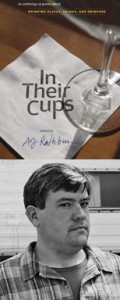 For the last poem in In Their Cups week 2010 (celebrating the release and release party this Sunday for In Their Cups and the drinking poems contained therein, as if you didn’t know), I wanted to highlight one of the two poems in book by Ed Skoog (I should mention though, that he also has translations in the book from three languages–you’ll have to look to find out which languages). Without Ed, In Their Cups would have been called “Cups with Holes” and been awfully leaky, cause he not only let me put poems and translations of his own in the book, but helped me track down more poems that made the cut and are in the book, gave advice on ordering of poems and sections, drank a lot with me during the putting together of the book, and was generally helpful in every way you can think of plus a few more you’d forgotten.
For the last poem in In Their Cups week 2010 (celebrating the release and release party this Sunday for In Their Cups and the drinking poems contained therein, as if you didn’t know), I wanted to highlight one of the two poems in book by Ed Skoog (I should mention though, that he also has translations in the book from three languages–you’ll have to look to find out which languages). Without Ed, In Their Cups would have been called “Cups with Holes” and been awfully leaky, cause he not only let me put poems and translations of his own in the book, but helped me track down more poems that made the cut and are in the book, gave advice on ordering of poems and sections, drank a lot with me during the putting together of the book, and was generally helpful in every way you can think of plus a few more you’d forgotten.
If you don’t know already, Ed is one of the best poets anywhere alive today–buy his book Mister Skylight and you will be changed–but is also a drink maker of some renown, a drink consumer of much renown, and a sweet banjo player to boot who can sing the high lonesome like few others (even after a few–let’s say 5-to-10–shots). If you ever are going into a bar for the long haul (which I’m guessing you will be, probably soon), bring him along. Or at least bring this poem of his about New Orleans’ Saturn Bar, a truly divine dive, along with you as an Ed sub.
The Last Saturn Bar Poem
Around the art barn, Mike Frolich’s bar-tab
bartered paintings hang the hell that rose with him
from the Gulf of Mexico floor too fast, torturing
blood with air: maniac fish, demon in a diving bell,
and then from cadmium sunset through marsh comes
the boat bearing forward in grand roving the name
O’Neal, our bartender. Theirs are the dreams we enter,
entering the Saturn Bar’s owly heat re-tooled for unlovely
loss, the rattled corner leaning away from Chartreuse, neat,
and when I’m able to dream jukebox damaged warbling,
a Saturn-like-thing opens within me, but this is the last
Saturn Bar poem–I’ll try, I’ll try–to stop singing
shadows of St. Claude and Clouet on security camera
pavement grays we keep talking about with increasing
reluctance, ready to move on to fresh bewilderments,
spiraling neon, neon that lights up my nameless shot.
—The Last Saturn Bar Poem, Ed Skoog
Tags: Bars, Cocktail Talk, drinking poems, Ed Skoog, In Their Cups, The Last Saturn Bar Poem
Posted in: Bars, Cocktail Talk, drinking poems, Drinking Writer, Ed Skoog, In Their Cups
September 23, 2010
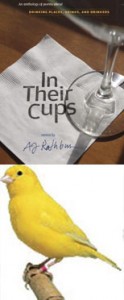 Continuing on with our week of poems from In Their Cups (in honor of the upcoming release reading which you already know lots about, and have told your friends about, and that hottie you see at the bus station) comes the poem with maybe my favorite title in the book: “Oh, For a Bowl of Fat Canary.” It’s by John Lyly, a writer in the late 1500s who had a way with words and drinks, and seems like someone you (and me) would want to spend a rowdy evening with, drinking and becoming jolly. “Canary” does not mean he was boozy enough to eat birds though. “Canary” was actually a type of sack from the Canary islands (with sack being an old term for a fortified white wine). Now, that makes it all a bit less unfriendly to our feathered friends.
Continuing on with our week of poems from In Their Cups (in honor of the upcoming release reading which you already know lots about, and have told your friends about, and that hottie you see at the bus station) comes the poem with maybe my favorite title in the book: “Oh, For a Bowl of Fat Canary.” It’s by John Lyly, a writer in the late 1500s who had a way with words and drinks, and seems like someone you (and me) would want to spend a rowdy evening with, drinking and becoming jolly. “Canary” does not mean he was boozy enough to eat birds though. “Canary” was actually a type of sack from the Canary islands (with sack being an old term for a fortified white wine). Now, that makes it all a bit less unfriendly to our feathered friends.
Oh, For a Bowl of Fat Canary
Oh, for a bowl of fat Canary,
Rich Palermo, sparkling Sherry,
Some nectar else, from Juno’s dairy;
Oh, these draughts would make us merry!
Oh, for a wench (I deal in faces,
And in other daintier things);
Tickled am I with her embraces,
Fine dancing in such fairy rings.
Oh, for a plump fat leg of mutton,
Veal, lamb, capon, pig, and coney;
None is happy but a glutton,
None an ass but who want money.
Wines indeed and girls are good,
But brave victuals feast the blood;
For wenches, wine, and lusty cheer,
Jove would leap down to surfeit here.
—Oh, For a Bowl of Fat Canary, John Lyly
September 21, 2010
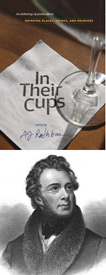 In Their Cups week continues here at Spiked Punch, with another poem from the raddest collection of drinking and drinkers poems I’ve ever been associated with up to date (if you missed it, it’s a week celebrating In Their Cups because of a certain reading this Sunday). For today’s pick, I’m going with a poem celebrating one of my favorite drinks, and the drink to have the first Saturday in May–the Mint Julep of course. This poem about the legendary birth of the Mint Julep is by Charles Fenno Hoffmann, who was a New York writer, editor, and critic in the 1800s. If you’ve ever had a truly well-made Mint Julep (on May 1st or any other day), you’ll understand why he’d write such a ringing and singing and immortalizing number about the drink (and if you haven’t had a Mint Julep that matches the below, maybe we need to get you a better recipe or point you to a different watering hole).
In Their Cups week continues here at Spiked Punch, with another poem from the raddest collection of drinking and drinkers poems I’ve ever been associated with up to date (if you missed it, it’s a week celebrating In Their Cups because of a certain reading this Sunday). For today’s pick, I’m going with a poem celebrating one of my favorite drinks, and the drink to have the first Saturday in May–the Mint Julep of course. This poem about the legendary birth of the Mint Julep is by Charles Fenno Hoffmann, who was a New York writer, editor, and critic in the 1800s. If you’ve ever had a truly well-made Mint Julep (on May 1st or any other day), you’ll understand why he’d write such a ringing and singing and immortalizing number about the drink (and if you haven’t had a Mint Julep that matches the below, maybe we need to get you a better recipe or point you to a different watering hole).
The Mint Julep
‘Tis said that the gods on Olympus of old
(And who the bright legend profanes with a doubt?)
One night, ’mid their revels, by Bacchus were told
That his last butt of nectar had somehow run out!
But determined to send round the goblet once more,
They sued to the fairer immortals for aid
In composing a draught which, till drinking were o’er,
Should cast every wine ever drank in the shade.
Grave Ceres herself blithely yielded her corn,
And the spirit that lives in each amber-hued grain,
And which first had its birth from the dew of the morn,
Was taught to steal out in bright dewdrops again.
Pomona, whose choicest of fruits on the board
Were scattered profusely in every one’s reach,
When called on a tribute to cull from the hoard,
Expressed the mild juice of the delicate peach.
The liquids were mingled while Venus looked on
With glances so fraught with sweet magical power,
That the honey of Hybla, e’en when they were gone,
Has never been missed in the draught from that hour
Flora, then, from her bosom of fragrancy, shook,
And with roseate fingers pressed down in the bowl,
All dripping and fresh as it came from the brook,
The herb whose aroma should flavor the whole.
The draught was delicious, and loud the acclaim,
Though something seemed wanting for all to bewail,
But Juleps the drink of immortals became,
When Jove himself added a handful of hail.
— The Mint Julep, Charles Fenno Hoffmann
September 19, 2010
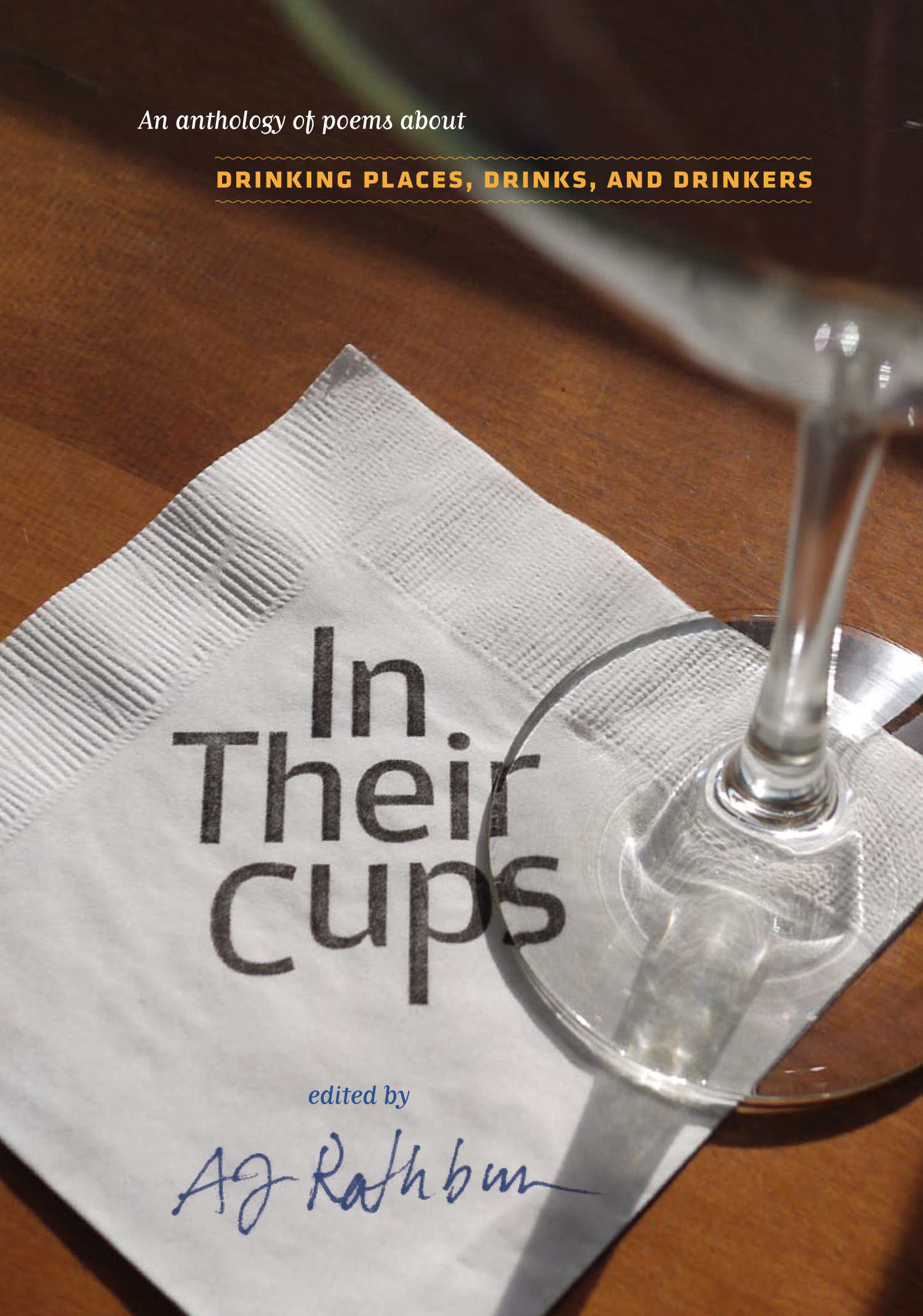 With the release reading for In Their Cups: An Anthology of Poems about Drinking Places, Drinks, and Drinkers just around the corner (and by “just around the corner” I mean Sunday, September 26th, at 3 pm, at the almighty Open Books), I wanted to prime the proverbial poetic drunken pump with a couple choice selections from said book. To get things started, much like the book itself gets started, here’s Keats’ rollicking reverie to his favorite bar, the Mermaid Tavern. It’s somehow weirdly (well, maybe it’s not weird–what do you
With the release reading for In Their Cups: An Anthology of Poems about Drinking Places, Drinks, and Drinkers just around the corner (and by “just around the corner” I mean Sunday, September 26th, at 3 pm, at the almighty Open Books), I wanted to prime the proverbial poetic drunken pump with a couple choice selections from said book. To get things started, much like the book itself gets started, here’s Keats’ rollicking reverie to his favorite bar, the Mermaid Tavern. It’s somehow weirdly (well, maybe it’s not weird–what do you 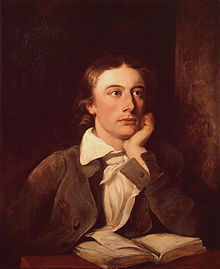 think, bar lovers?) reassuring to me that Keats had a favorite drinking spot in the early 1800s that he wrote about, and by his writing I think I might have enjoyed sitting there with pals having pints (and the occasional Dog’s Nose, as they did at the time). So, take a step back with Mr. Keats before all this internet-y-ness, when folks actually did their talking and drinking face-to-face.
think, bar lovers?) reassuring to me that Keats had a favorite drinking spot in the early 1800s that he wrote about, and by his writing I think I might have enjoyed sitting there with pals having pints (and the occasional Dog’s Nose, as they did at the time). So, take a step back with Mr. Keats before all this internet-y-ness, when folks actually did their talking and drinking face-to-face.
Lines on the Mermaid Tavern
Souls of Poets dead and gone,
What Elysium have ye known,
Happy field or mossy cavern,
Choicer than the Mermaid Tavern?
Have ye tippled drink more fine
Than mine host’s Canary wine?
Or are fruits of Paradise
Sweeter than those dainty pies
Of venison? O generous food!
Drest as though bold Robin Hood
Would, with his maid Marian,
Sup and bowse from horn and can.
I have heard that on a day
Mine host’s sign-board flew away,
Nobody knew whither, till
An astrologer’s old quill
To a sheepskin gave the story,
Said he saw you in your glory,
Underneath a new old-sign
Sipping beverage divine,
And pledging with contented smack
The Mermaid in the Zodiac.
Souls of Poets dead and gone,
What Elysium have ye known,
Happy field or mossy cavern,
Choicer than the Mermaid Tavern?
— Lines on the Mermaid Tavern, John Keats
September 8, 2010
 Calling all drinkers, drink-makers, poets, poetry-readers, and anyone who is friends with anyone who fits in the above categories–which means, calling everyone. I was lucky enough to spend a chunk of the last year or so editing up a collection of poems about drinking places, drinks, and drinkers, and you’re lucky because said collection is coming out this month, and we’re having a big reading/party to celebrate. It’s going to be September 26th, at 3 pm, at Open Books here in Seattle (Open Books is at 2414 N. 45th St. Seattle, and the full reading listing is here).
Calling all drinkers, drink-makers, poets, poetry-readers, and anyone who is friends with anyone who fits in the above categories–which means, calling everyone. I was lucky enough to spend a chunk of the last year or so editing up a collection of poems about drinking places, drinks, and drinkers, and you’re lucky because said collection is coming out this month, and we’re having a big reading/party to celebrate. It’s going to be September 26th, at 3 pm, at Open Books here in Seattle (Open Books is at 2414 N. 45th St. Seattle, and the full reading listing is here).
Wait, though, jump back–I haven’t even told you the name yet. The anthology is called In Their Cups, and it features poets from hither and yon, poets who wrote in ancient times all the way up to poets who wrote a line yesterday. The whole idea behind the book (in a way) was to populate one giant bar with poets from throughout history, give them all some cocktails, and let them start spouting poems that would encompass the experiences of all drinkers. Did it work? You can find out by coming to the reading (or picking up the book, if you can’t make it). The reading will feature four of Seattle’s finest poets (and me) reading the poem they have in the book, plus a couple others from poets who couldn’t make it because they don’t live nearby, or don’t live at all anymore. The line-up includes:
-
Effervescent Emily Bedard
-
Action-packed Allen Braden
-
Jumpin’ jolly James Gurley
-
Awfully excited to be in such company A.J. Rathbun
-
One giant mystery guest
If you still aren’t sold, the full-on listing of poets who have poems on the pages of In Their Cups is: A.J. Rathbun, Henry Aldrich, Thomas Bailey Aldrich, Guillaume Apollinaire, Emily Bedard, Bridget Bell, Allen Braden, Henry Carey, Richard Carr, Catullus, John Clare, Jaime Curl, Emily Dickinson, Philip Dow, Paul Laurence Dunbar, Stephen Dunn, Amy Fleury, Philip Freneau, Du Fu, Thomas Godfrey, Jeff Greer, James Gurley, Mark Halliday, Robert Herrick, Charles Fenno Hoffman, Oliver Wendell Holmes, Elizabeth Hughey, Richard Hugo, Christopher Janke, Jonathan Jonson, John Keats, J. Robert Lennon, John Lyly, William Maginn, Tod Marshall, Robert Hinkley Messinger, Dan Morris, Joseph O’Leary, William Olsen, Cesare Pavese, Li Po, Francesco Redi, Arthur Rimbaud, Ed Skoog, Gerald Stern, George Walter Thornbury, Chase Twichell, and Royall Tyler.
See you on the 26th friends and neighbors and local poetic drunkards.
Tags: Allen Braden, bar poems, drink poems, drinker poems, drinking poems, Drinking Writer, Ed Skoog, Emily Bedard, In Their Cups, James Gurley, poems
Posted in: Bars, cocktail poem, drinking poems, Drinking Writer, Ed Skoog, In Their Cups
July 21, 2009
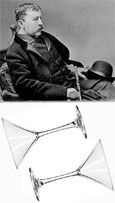 As captain of industry Ed Skoog said in a recent blog post for the Seattle PI (which used to be a paper, but which now is a website, or something like that, as the song says), “summertime is poetry time.” Well, maybe that’s a paraphrase, but it was close, and when I was drinking with him last week he at least mumbled that exact phrase. Which is why I wanted to put up this poem called “The Menu” for you, dear Spiked Punch reader, to make your summertime complete. And, cause I like the rhyme of “the days” and “mayonnaise.” Thomas Bailey Aldrich, the author, is dead. But he had a rollicking time of it before March 19, 1907, from what little I know, and from reading this poem, which is pretty darn celebratory of the drinking-and-eating-with-pals-makes-life-better theory, a theory I have signed on for myself. With that said, have a pal or two over, make some treats of the liquid and edible variety, and read this out loud. It’s a hoot. Hoot, hoot. Or maybe I’ll just record myself reading it? Unless you send me pictures of writers or pets drinking. That’s a threat.
As captain of industry Ed Skoog said in a recent blog post for the Seattle PI (which used to be a paper, but which now is a website, or something like that, as the song says), “summertime is poetry time.” Well, maybe that’s a paraphrase, but it was close, and when I was drinking with him last week he at least mumbled that exact phrase. Which is why I wanted to put up this poem called “The Menu” for you, dear Spiked Punch reader, to make your summertime complete. And, cause I like the rhyme of “the days” and “mayonnaise.” Thomas Bailey Aldrich, the author, is dead. But he had a rollicking time of it before March 19, 1907, from what little I know, and from reading this poem, which is pretty darn celebratory of the drinking-and-eating-with-pals-makes-life-better theory, a theory I have signed on for myself. With that said, have a pal or two over, make some treats of the liquid and edible variety, and read this out loud. It’s a hoot. Hoot, hoot. Or maybe I’ll just record myself reading it? Unless you send me pictures of writers or pets drinking. That’s a threat.
The Menu
I beg you come to-night and dine.
A welcome waits you, and sound wine–
The Roederer chilly to a charm,
As Juno’s breath the claret warm,
The sherry of an ancient brand.
No Persian pomp, you understand–
A soup, a fish, two meats, and then
A salad fit for aldermen
(When aldermen, alas, the days!
Were really worth their mayonnaise);
A dish of grapes whose clusters won
Their bronze in Carolinian sun;
Next, cheese–for you the Neufchatel,
A bit of Cheshire likes me well;
Cafe au lait or coffee black,
With Kirsch or Kummel or Cognac
(The German band in Irving Place
By this time purple in the face);
Cigars and pipes. These being through,
Friends shall drop in, a very few–
Shakespeare and Milton, and no more.
When these are guests I bolt the door,
With Not at Home to any one
Excepting Alfred Tennyson.
–Thomas Bailey Aldrich, The Menu
 Walking along on a dusky springtime eve
Walking along on a dusky springtime eve


























